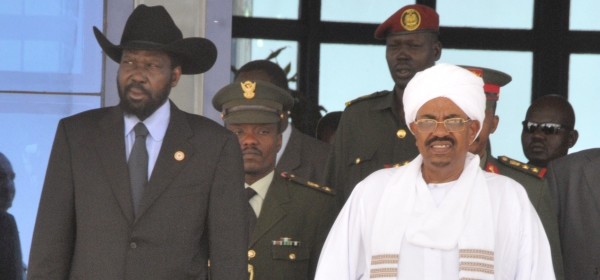No settlement to revive the cross-border oil economy emerged from the presidential summit in Addis Ababa, with leaders of Sudan and South Sudan instead making only a vague recommitment to the oil deal inked in September.
Both cash-starved governments are keen for a solution, but the existing oil deal has remained hostage to political inertia since mid-November when developments around the Islamic Movement Conference diverted the attention of key decision-makers in Khartoum even into the deepening crisis.
Ethiopian Prime Minister Haile Mariam Desalegn, who presided over the September oil deal shortly after coming to power, believed that a face-to-face meeting between Sudanese President Omar al-Bashir and South Sudanese President Salva Kiir would give new impetus to the deal.
Desalegn last month paid a visit to al-Bashir in Khartoum – who has recovered at least temporarily from the cancerous growth in his throat – and then to Kiir in Juba to urge the two leaders to join him in Addis Ababa for a presidential summit on the outstanding issues.
Expectations for the planned summit ran high, with foreign ministers of the Western ‘Troika’ powers backing the talks in a joint statement Thursday, noting “the restart of oil production and export will be particularly valuable for both economies and should not be held up by negotiation on other issues.”
The summit held from January 4-5 involved a series of meetings among the three African leaders together with the chief mediator Thabo Mbeki, chairman of the African Union High Implementation Panel (AUHIP) for Sudan and South Sudan.
Defying expectations, the summit resulted in no major breakthrough. Sudan’s state news agency in the immediate aftermath of the talks mused on the “atmosphere tense with failure.”
Mbeki acknowledged in remarks to the press that the presidents did not discuss oil agreements per se, but rather the whole package of deals signed last September in Addis Ababa. The agenda for the talks also included withdrawal of troops from the agreed buffer zone. In effect, mediators heeded the insistence of Sudanese negotiators who since the signing of the Addis Ababa agreements have tied implementation of the oil deal to progress on security issues.
In the only nod to the oil issue, the presidents agreed that the AUHIP mediators should “draw up a Matrix, with Timeframes,” for implementation of all existing agreements, according to an outcomes report on the summit published in the names of Desalegn and Mbeki.
Desalegn and Mbeki were unclear as to how al-Bashir and Kiir would use this matrix and whether they had actually agreed to be bound to it. The only explicit commitment the two presidents made “as part of completing the Matrix” was that their defense ministers should convene January 13 to ensure demilitarization of the border zone as previously agreed.
This would require South Sudan to withdraw troops from the ‘Mile 14’ strip on the Darfur frontier, an area that has harbored the Justice and Equality Movement and other insurgents. That stipulation, coupled references to the SPLA-North, suggest that the rebellions in South Kordofan and Darfur remain a major preoccupation for al-Bashir in the talks.
A concession from Kiir appeared aimed at assuaging that concern. “The President of the Republic of South Sudan reiterated that the Directives he had issued before the independence of South Sudan for the disengagement of the SPLM from the SPLM-N and the SPLA from the SPLA-N had been carried out,” the AU reported.
Some recent diplomatic signals have suggested that the African mediators have been losing traction with Khartoum. Egyptian president Mohamed Morsy after a meeting with Sudanese Foreign Minister Ali Karti just a day ahead of the summit openly entertained the idea of taking a role in mediating. The Turkish foreign minister made similar statements the prior week, also after meeting Karti, telling press “we have agreed in principle to mediate between Juba and Khartoum.”
African mediators, perhaps sensitive to this development, have put more scrutiny on South Sudan over the SPLA-N issue. The mediators apparently sent a letter to Kiir about SPLA-N, to which Kiir intends to respond.
Elsewhere in the official outcomes document, it is explained that Kiir and al-Bashir have deferred a decision on the final status of the Abyei area but have agreed to direct their joint committee, headed by al-Khair al-Fahim and Luka Biong Deng, to constitute a local administration, legislative council and police service for the disputed area. This represents limited progress on the Abyei file.
To contact Radio Tamazuj with news tips or information write to radiotamazuj@gmail.com. For instant updates follow @RadioTamazuj on Twitter.




